NIV Application Commentary: Old Testament, 22 vols. (NIVAC)
Digital Logos Edition
Overview
How can you apply what you learned about Creation, the fall of man, or the nation of Israel to our present day needs? How can you take a message originally spoken in Hebrew and communicate it clearly in our own language? How can you take the eternal truths originally spoken in a different time and culture and apply them to the similar-yet-different needs of our culture? These Old Testament volumes of the NIV Application Commentary show readers how to bring an ancient message into our contemporary context. It explains not only what the Bible meant, but also how it speaks powerfully today.
The award-winning NIV Application Commentary series helps you understand the original meaning of the biblical text in its original context. All the elements of traditional exegesis—in concise form—are discussed. But the authors don’t stop there—they bridge the gap between the world of the Bible and the world of today, between the original context and the contemporary context, by focusing on both the timely and timeless aspects of the text. The authors dwell on the contemporary significance of the Bible by focusing on contemporary contexts in which the Bible can be applied today. The NIV Application Commentary discusses the Bible in a way that engages contemporary life and culture.
Most Bible commentaries take us on a one-way trip from our world to the world of the Bible. But they leave us there, assuming that we can somehow make the return journey on our own. They focus on the original meaning of the passage but don’t discuss its contemporary application. The information they offer is valuable—but the job is only half done! The NIVAC series helps bring both halves of the interpretive task together. This unique, award-winning series shows readers how to bring an ancient message into our postmodern context. It explains not only what the Bible meant but also how it speaks powerfully today.
The tools, ideas, and insights contained in these volumes will help preachers communicate God’s Word and understand the Old Testament in the context of contemporary culture, and the exegetical, literary, and grammatical summaries will benefit scholars and students of the Bible. What’s more, with Logos, Scripture passages are linked to Hebrew texts, along with English translations, and the powerful search tools provide instant access to the information you need for research projects, sermon preparation, and personal study.
This collection contains only the Old Testament commentaries. The commentaries on the New Testament are available separately in the The NIV Application Commentary: New Testament, 20 vols. (NIVAC).
Get the new volume in this series: Ezra, Nehemiah.
- Three sections for every passage:
- Original Meaning
- Bridging Contexts
- Contemporary Significance
- Detailed footnotes point toward other scholarly works for reading and research
- Lengthy bibliography included in each volume
The NIV Application Commentary series doesn’t fool around. It gets right down to business, bringing this ancient and powerful Word of God into the present so that it can be heard and delivered with all the freshness of a new day, with all the immediacy of a friend’s embrace.
—Eugene H. Peterson, Professor Emeritus of Spiritual Theology, Regent College
It is encouraging to find a commentary that is not only biblically trustworthy but also contemporary in its application. The NIV Application Commentary will prove to be a helpful tool in the pastor’s sermon preparation. I use it and recommend it.
—Charles F. Stanley, Founder and President, In Touch Ministries
The NIV Application Commentary series promises to be of very great service to all who preach and teach the Word of God.
—J. I. Packer,, Board of Governors' Professor of Theology, Regent College
This series promises to become an indispensable tool for every pastor and teacher who seeks to make the Bible's timeless message speak to this generation.
—Billy Graham, American Evangelist
The NIV Application Commentary is an outstanding resource for pastors and anyone else who is serious about developing 'doers of the Word.'
—Rick Warren, Pastor, Saddleback Valley Community Church
If you want to avoid hanging applicational elephants from interpretive threads, then the NIV Application Commentary is for you! This series excels at both original meaning and contemporary significance. I support it one hundred percent.
—Howard G. Hendricks, Professor, Dallas Theological Seminary
The NIV Application Commentary will be a great help for leaders who want to understand what the Bible means, how it applies, and what they should do in response.
—Stuart Briscoe, Pastor, Elmbrook Church
This is the pulpit commentary for the twenty-first century.
—George K. Brushaber, former President, Bethel College and Seminary
The NIV Application Commentary builds bridges that make the Bible come alive with meaning for contemporary life.
—Warren W. Wiersbe, General Director, Back to the Bible
The NIV Application Commentary meets the urgent need for an exhaustive and authoritative commentary based on the New International Version. This series will soon be found in libraries and studies throughout the evangelical community.
—D. James Kennedy, Founder, Coral Ridge Presbyterian Church
The NIV Application Commentary series helps pastors and other Bible teachers with one of the most neglected elements in good preaching—accurate, useful application. Most commentaries tell you a few things that are helpful and much that you do not need to know. By dealing with the original meaning and contemporary significance of each passage, the NIV Application Commentary series promises to be helpful all the way around.
—James Montgomery Boice, former Pastor, Tenth Presbyterian Church
Here, at last, is a commentary that makes the proper circuit from the biblical world to Main Street. The NIV Application Commentary is a magnificent gift to the church!
—R. Kent Hughes, Senior Pastor Emeritus, College Church, Wheaton, IL
This series dares to go where few scholars have gone before—into the real world of biblical application faced by pastors and teachers every day. This is everything a good commentary series should be.
—Leith Anderson, President, National Association of Evangelicals
Here at last is a commentary which is not only academically well informed but which helps the contemporary reader hear God’s Word and consider its implications: scholarship in the service of the Church.
—Arthur Rowe, Tutor in New Testament and World Religions, Spurgeon’s College
- Title: NIV Application Commentary: Old Testament
- Series: NIV Application Commentary (NIVAC)
- Publisher: Zondervan
- Volumes: 22
- Pages: 13,296
- Resource Type: Commentaries
- Topic: Biblical Studies
This title is included in the following collections
You can save when you purchase this product as part of a collection.
Zondervan Commentary Collectio...
$7,697.16$3,599.99Zondervan Ultimate Collection ...
$21,970.44$16,474.99
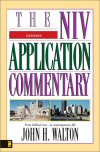
The Bible begins and ends with a revelation of God that gives redemption its basis. From the first verse of Genesis, the book of origins, we encounter a God of personality, character, purpose, and activity. Only in the light of what he shows us of himself as the creator of our world and the interactor with human history does the salvation story assume its proper context. Genesis sets things in order: God first, then humankind.
In the words of Genesis’ general editor, “Especially after the Tower of Babel it became evident that people had forgotten who God was. They needed reminding. The moves God made were essentially concerned with putting himself in front of the world’s peoples.” Today, perhaps more than ever, we need God to put himself in front of us, to remind us who he is.
With characteristic creativity and uncommon depth, John H. Walton demonstrates the timeless relevance of Genesis. Revealing the links between Genesis and our own times, Dr. Walton shows how this mysterious, often baffling book filled with obscure peoples and practices reveals truth to guide our twenty-first-century lives.
John H. Walton (PhD, Hebrew Union College) is a professor of Old Testament at Wheaton College Graduate School. He is the author or coauthor of several books, including Chronological and Background Charts of the Old Testament, Ancient Israelite Literature in Its Cultural Context, Covenant: God’s Purpose, God’s Plan, The IVP Bible Background Commentary: Old Testament, and A Survey of the Old Testament.
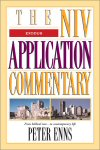
Peter E. Enns’ commentary on Exodus helps readers learn how the message of Exodus can have the same powerful impact today that it did when it was first written.
Peter E. Enns is a Reformed evangelical Christian and a biblical scholar. A frequent contributor to journals and encyclopedias, he is the author of several books, including Inspiration and Incarnation: Evangelicals and the Problem of the Old Testament.
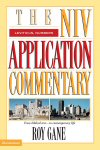
The books of Leviticus and Numbers spell out God’s legal requirements for ancient Israel. But that was over three millennia ago. Now that we’re under a new covenant of grace, how do strange laws and obscure, seemingly trifling details regarding everything from temple sacrifice to household mold have any bearing on us today? If the Law was perfectly fulfilled in Jesus, why bother studying arcane regulations that no longer apply?
Because they do apply. Their original contexts may have disappeared, but the principles behind them are replete with relevance. Moreover, in our individualistic and selfish culture, they restore to us a God’s-eye vision that extends beyond ourselves to the church as community.
Exploring the links between the Bible and our own times, Roy Gane helps readers learn how the messages of Leviticus and Numbers can have the same powerful impact today that they did when they were first written.
Roy Gane (PhD, University of California, Berkeley) is a professor of Hebrew Bible and ancient Near Eastern languages at the Theological Seminary of Andrews University. He is author of a number of scholarly articles and several books, including God’s Faulty Heroes, Altar Call, Ritual Dynamic Structure, and Cult and Character: Purification Offerings, Day of Atonement, and Theodicy, as well as the Leviticus portion of the Zondervan Illustrated Bible Backgrounds Commentary on the Old Testament.
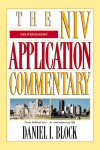
The theological significance of Deuteronomy cannot be overestimated. Few books in the Bible proclaim such a relevant word of grace and gospel to the church today. At its heart, Deuteronomy records the covenantal relationship between God and his people. God graciously has chosen Israel as his covenant partner and has demonstrated his covenantal commitment to them. Moses challenges the Israelites to respond by declaring that Yahweh alone is their God and by demonstrating unwavering loyalty and total love for him through obedience.
Daniel Block highlights the unity between the God depicted in Deuteronomy and Jesus Christ. Christians who understand the covenantal character of God and who live under the grace of Christ will resist the temptation to retreat into interior and subjective understandings of the life of faith so common in Western Christianity.
Daniel I. Block received his PhD from the University of Liverpool, and is the Gunther H. Knoedler Professor of Old Testament at Wheaton College. He is the author of The New Ammerican Commentary: Judges, Ruth, and was a speaker at the Pastorum Live 2012 Conference.
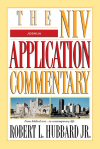
Reading Joshua can bring up serious, troubling questions about God’s attitude toward his people, questions with no easy answer. Robert L. Hubbard Jr.’s commentary aims to translate the book of Joshua, with its ancient cultural form, in such a way that it freely speaks about the life of faith today. The book of Joshua tells how biblical Israel navigated a major historical transition early in its national life. The book shows that the one guiding these changes is Israel’s God, Yahweh, through his chosen servant, Joshua.
The introductory sections set the scene for entering the book of Joshua and the ancient world about which it reports. Joshua helps readers learn how the message of Joshua can have the same powerful impact today that it did when it was first written.
Robert L. Hubbard Jr. (PhD, Claremont Graduate School) is a professor of Biblical literature at North Park Theological Seminary in Chicago, IL. He also taught at Denver Seminary and served as a chaplain on active duty in the United States Navy and in the United States Naval Reserve. Hubbard is author of The Book of Ruth: New International Commentary on the Old Testament, which received the Christianity Today Critics Choice Award as the best commentary of 1989, and he coauthored Introduction to Biblical Interpretation with William Klein and Craig Blomberg.
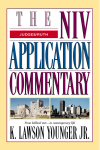
The concept of judgment is at odds with today’s culture, which considers it a sin to suggest there is such a thing as sin. Perhaps that is partly because we have seen all too clearly the fallibility of those who judge. What many of us long for is not judgment, but righteousness and deliverance from oppression. That is why the books of Judges and Ruth are so relevant today. Judges reveals a God who employs very human deliverers but refuses to gloss over their sins and the consequences of those sins, and Ruth demonstrates the far-reaching impact of a righteous character. Exploring the links between the Bible and our own times, K. Lawson Younger Jr. shares literary perspectives on the books of Judges and Ruth that reveal ageless truths for our twenty-first-century lives.
K. Lawson Younger Jr. (PhD, University of Sheffield) is a professor of Old Testament, Semitic languages, and ancient Near Eastern history at Trinity Evangelical Divinity School in Deerfield, IL. He is the author, associate editor, and coeditor of several books, and has contributed to numerous collections of essays, dictionaries, and periodicals.
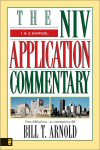
Why do the books of Samuel pack such broad appeal? Taken together as a single narrative, they certainly offer something for everyone: kings and prophets, great battles and greater heroes, action and romance, loyalty and betrayal, the mundane and the miraculous. In Samuel, we meet Saul, David, Goliath, Jonathan, Bathsheba, the witch of Endor, and other unforgettable characters. And we encounter ourselves. For while the culture and conditions of Israel under its first kings are vastly different from our own, the basic issues of humans in relation to God, the Great King, have not changed. Sin, repentance, forgiveness, adversity, prayer, faith, and the promises of God—these continue to play out in our lives today.
Exploring the links between the Bible and our own times, Bill T. Arnold shares perspectives on 1 and 2 Samuel that reveal ageless truths for our twenty-first-century lives.
Bill T. Arnold (PhD, Hebrew Union College) is the director of Hebrew studies and a professor of Old Testament and Semitic languages at Asbury Theological Seminary in Wilmore, Kentucky. He is the author of Encountering the Book of Genesis and coauthor of Encountering the Old Testament and A Guide to Biblical Hebrew Syntax.
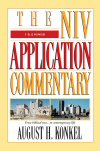
Readers of 1 and 2 Kings commonly approach these books as a straightforward chronology of post-Davidic Israel: the inauguration of Solomon’s reign, the division of the kingdom following his death, and Israel’s and Judah’s ensuing kings, conflicts, captivities, and overarching spiritual decline.
In reality, the books of the Kings fall into the collection known as the former Prophets, and their true story and underlying theme center on such striking personalities as Nathan, Elijah, Elisha, and other divinely appointed spokesmen. It is God’s interaction with his people by way of his prophets and their kings—his pleadings, his warnings, and the fulfillment of his words—that comes across again and again with forcefulness and clarity. God speaks; now will his people hear, believe, and respond?
The question is as relevant for us today as it was for the ancient Israelites. Bridging the centuries, August Konkel connects past context to contemporary circumstances, helping us grasp the meaning and significance of 1 and 2 Kings and take to heart their message for us today.
A. H. Konkel is the president of Providence College and Seminary in Otterburne, Manitoba. He earned his PhD from Westminster Theological Seminary in 1987. He served as a translator for the book of Job in the New Living Translation, and completed a commentary on Job for the Cornerstone Biblical Commentary. He was a contributor to the New International Dictionary of Old Testament Theology and Exegesis.
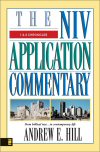
The Chronicles are more than a history of ancient Israel under the ascent and rule of the Davidic dynasty. They are a story whose grand theme is hope. Great battles are fought, heroes and tyrants vie for power, Israel splits into rival kingdoms, and the soul of God’s holy nation oscillates between faithlessness and revival. Yet above this tossing sea of human events, God’s covenant promises reign untroubled and supreme. 1 and 2 Chronicles are a narrative steeped in the best and worst of the human heart, but they are also a revelation of Yahweh at work, forwarding his purposes in the midst of fallible people. God has a plan to which he is committed.
God redirects our vision from our circumstances in this turbulent world to the surety of his kingdom, and to himself as our source of confidence and peace. Exploring the links between the Bible and our own times, Andrew E. Hill shares perspectives on 1 and 2 Chronicles that reveal ageless truths for our twenty-first-century lives.
Andrew E. Hill (PhD, University of Michigan) is a professor of Old Testament studies at Wheaton College in IL. He is the coauthor with John Walton of A Survey of the Old Testament and the author of Malachi in the Anchor Yale Bible commentary series. His articles have appeared in such scholarly publications as Hebrew Annual Review, Journal of Biblical Literature, and Vetus Testamentum.
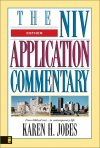
Queen Esther faced and helped avert the potential genocide of her people. She rose to the pinnacle of political power without any of the advantages of aristocratic birth, well-placed friends, inherited wealth, or social prestige.
Yet Esther’s real story is not found in political intrigue or superior management ideals. It is that God is at the center of it, despite the fact that God is not mentioned anywhere in the book. The great lesson to be learned is that God keeps his promises.
This commentary shows how the book of Esther is the perfect guidance for us when we find ourselves in a situation where right and wrong are not so clearly defined and every choice we have seems to be a troubling mixture of good and bad. It is perfect inspiration for us when we find ourselves in situations we never sought, never planned for, and don’t think we have the gifts to succeed at.
Karen H. Jobes is Gerald F. Hawthorne Professor of New Testament Greek and Exegesis at Wheaton College. She is the author of many articles and several books, including Letters to the Church: A Survey of Hebrews and the General Epistles and 1 Peter in the Baker Exegetical Commentary on the New Testament.
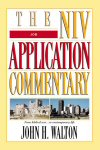
The title character of the book of Job suffers terribly, but we should not mistakenly think that this book is just about Job. It is about all of us, and ultimately about God.
Many have thought that the book simply restates the perennial questions that plague humankind in a world full of suffering. But often our questions are too limited, and we must learn to ask better questions so that we might find more significant answers. The book of Job answers our original questions obliquely, letting these answers prompt deeper questions, and leading us to discover the wealth that the book has to offer.
A lot of people assume that the book of Job deals with the question of why righteous people suffer. Instead, John Walton suggests that the book is about the nature of righteousness—not the nature of suffering. As we learn to deepen our questions, God will transform how we think about his work in the world and about our responses in times of suffering.
John H. Walton received his PhD from Hebrew Union College and is professor of Old Testament at Wheaton College Graduate School. Before teaching at Wheaton, Walton taught at Moody Bible Institute for 20 years. He is the author or co-author of several books, including Zondervan Illustrated Bible backgrounds Commentary: Old Testament, Ancient Near Eastern Thought and the Old Testament, The IVP Bible Background Commentary: Old Testament, and A Survey of the Old Testament. He was also a speaker at the Pastorum Live 2012 Conference.
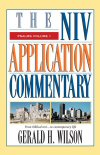
Perhaps more clearly than any other part of the biblical canon, the Psalms are human words directed to God. Yet, through the Holy Spirit, these honest, sometimes brutal words return to us as the Word of God. Their agonies and exaltations reflect more than the human condition in which they were created. Within the context of the canonical Psalter, they become the source of divine guidance, challenge, confrontation, and comfort. However, it is possible to misapply them. How can we use the Psalms in a way that faithfully connects God’s meaning in them and his intentions for them with our circumstances today?
Drawing on over 20 years of study in the book of Psalms, Gerald H. Wilson reveals the links between the Bible and our present times. While he considers each psalm in itself, Wilson also goes much further, examining whole groups of psalms and, ultimately, the entire Psalter, its purpose, and its use from the days of Hebrew temple worship onward through church history. In so doing, Wilson opens our eyes to ageless truths for our twenty-first-century lives.
Gerald H. Wilson (PhD, Yale University) was a professor of Old Testament and Biblical Hebrew at Azusa Pacific University. He wrote The Editing of the Hebrew Psalter, and he has written numerous articles for journals, encyclopedias, and reviews.
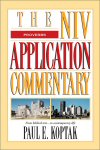
Wisdom can certainly help you acquire wealth, influence people, or succeed at your career, yet it involves more than knowledge alone. It’s also a matter of understanding God’s perspectives in applying what you know and having the character to act accordingly. That is why true wisdom—the kind that begins with fear of the Lord—frequently runs counter to what our culture values and applauds. This is the wisdom the book of Proverbs teaches.
Proverbs deals with the relationship between heaven and earth on a practical level that covers the broad swath of human activity. We could all use more wisdom in our lives; the book of Proverbs was designed to guide us into it. Proverbs is far from monolithic. It has multiple authors and employs diverse styles. But its goal remains simple: to equip us for living in a way that succeeds first and foremost in God’s eyes. Exploring the links between the Bible and our own times, Paul Koptak shares perspectives on Proverbs that reveal ageless truths for our twenty-first-century lives.
Paul E. Koptak (PhD, Garrett Evangelical Theological Seminary/Northwestern University) is Paul and Bernice Brandel Professor of Communication and Biblical Interpretation at North Park Theological Seminary in Chicago, IL.
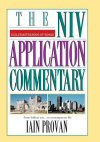
Iain Provan’s commentary sets out to wrestle honestly with all the challenges of reading Ecclesiastes and Song of Songs—the challenges of reading the texts in themselves and the challenges of reading them as intrinsic parts of Christian Scripture. In the course of the exploration, these books are seen to be deeply relevant in what they have to say both to the contemporary church and the contemporary culture.
Revealing the links between the Scriptures and our own times, Ian Provan shows how the wisdom books of Ecclesiastes and the Song of Songs speak to us today with relevance and conviction.
Iain Provan (PhD, Cambridge University) is Marshall Sheppard Professor of Biblical Studies at Regent College and an ordained minister of the Church of Scotland. He is the author of commentaries on Lamentations and on 1 and 2 Kings.
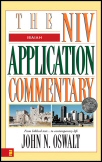
Isaiah
- Author: John N. Oswalt
- Publisher: Zondervan
- Publication Date: 2003
- Pages: 736
Isaiah wrestles with the realities of people who are not convicted by the truth but actually hardened by it, as well as with a God whose actions sometimes seem unintelligible, or even worse, absent. Yet Isaiah penetrates beyond these experiences to an even greater reality. Isaiah sees God’s rule over history and his capacity to take the worst of human actions and use it for good. He declares the truth that, even in the darkest hours, the Holy One of Israel is infinitely trustworthy.
John N. Oswalt is a research professor of Old Testament at Wesley Biblical Seminary in Jackson, Mississippi. He is the author of numerous articles and several books, including Called to be Holy: A Biblical Perspective.
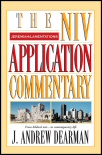
Jeremiah, Lamentations
- Author: J. Andrew Dearman
- Publisher: Zondervan
- Publication Date: 2002
- Pages: 496
The books of Jeremiah and Lamentations cannot be separated from the political conditions of ancient Judah. Beginning with the righteous king Josiah, who ushered in a time of glorious but brief religious reform, Jeremiah reflects the close tie between spiritual and political prosperity and disaster, between the actions and heart of Judah and her kings and their fortunes as a nation.
While few of us today have any firsthand understanding of what it means to live in a theocracy, the central theme of Jeremiah and Lamentations remains clear and still holds true: God first, politics second. The words, prayers, and poems of “the weeping prophet” serve to realign us with God’s priorities, turning us from evil and encouraging us to pursue God and his ways. With emotion and spiritual depth, these prophetic writings beckon us toward a spiritual integrity that can still affect the course of individuals and nations today.
J. Andrew Dearman is a professor of Old Testament and the academic dean at Austin Presbyterian Theological Seminary in Austin, Texas. He has worked on archaeological projects in Israel and Jordan. He is the author of Property Rights in the Eighth-Century, Prophets, and Religion and Culture in Ancient Israel.
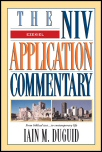
Ezekiel
- Author: Iain M. Duguid
- Publisher: Zondervan
- Publication Date: 1999
- Pages: 576
Properly understood, this mysterious book, with its obscure images, offers profound comfort to us today. Filled with both an indictment of sin and promise for God’s people, it can help us to live, like the ancient Israelites during the Babylonian captivity, as exiles in the foreign country of this world, with endurance and hope. Ezekiel helps readers learn how the message of Ezekiel can have the same powerful impact today that it did when it was first written.
Iain M. Duguid is a professor of religion at Grove City College in Grove City Pennsylvania and the author of Ezekiel and the Leaders of Israel.
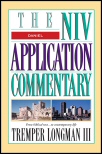
Daniel
- Author: Tremper Longman III
- Publisher: Zondervan
- Publication Date: 1999
- Pages: 320
This volume looks at the book of Daniel, revealing that God, not a human king, is ultimately in control—an appropriate message for today’s world of moral decline and political upheaval. This book will help readers bridge the gap between the sixth century BC and the present day.
Tremper Longman III (PhD, Yale University) is the Robert H. Gundry Professor of Biblical Studies and the chair of the religious studies department at Westmont College in Santa Barbara, California, where he lives with his wife, Alice. The Old Testament editor for the revised Expositor’s Bible Commentary, he has authored many articles and books on the Psalms and other Bible Studies.
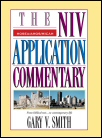
Hosea, Amos, Micah
- Author: Gary V. Smith
- Publisher: Zondervan
- Publication Date: 2001
- Pages: 608
Scratch beneath the surface of today’s culture and you’ll find we’re not so different from ancient Israel. True, our sophistication, mobility, and technology eclipse anything the Israelites could have imagined. Our worship is far different, to say nothing of our language and customs. Yet if the prophets Hosea, Amos, and Micah were to visit us today, we might be shocked to see how little their messages would differ from the ones they delivered 2,800 years ago.
For human hearts are still the same—and so is God. Injustice, oppression, and political corruption anger him as much as ever. Apostasy still grieves him. His judgment of sin remains as fierce as his love is strong. And the hope God extends to those who turn toward him is as brilliant now as at any time in history.
Revealing the links between Israel in the eighth century BC and our modern world, Gary V. Smith shows how the prophetic writings of Hosea, Amos, and Micah speak to us today with relevance and conviction.
Gary Smith is a professor of Old Testament and Hebrew at Midwestern Baptist Theological Seminary. He has written numerous articles, reviews, translations, and books on the Old Testament.
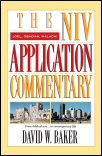
Joel, Obadiah, Malachi
- Author: David W. Baker
- Publisher: Zondervan
- Publication Date: 2006
- Pages: 352
These three short, prophetic Old Testament books each contain a dual message. On one hand are messages of impending judgment—for all peoples on the Day of the Lord, for an enemy of Israel, and for Israel herself. On the other hand are messages of great hope—of the pouring out of God’s Spirit, of restoration and renewal, and of a coming Messiah.
Placing judgment and hope together in such a manner may seem paradoxical to a contemporary mindset. But the complete message of these prophets gives a fuller picture of God, who despises and rightly judges sin and rebellion, but who also lovingly invites people to return to him so that he might bestow his wonderful grace and blessings. It is a message no less timely today than when these books were first written, and David W. Baker skillfully bridges the centuries in helping believers today understand and apply it.
David W. Baker is a professor of Old Testament and Semitic languages at Ashland Theological Seminary.
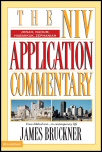
Jonah, Nahum, Habakkuk, Zephaniah
- Author: James Bruckner
- Publisher: Zondervan
- Publication Date: 2004
- Pages: 368
The prophetic books of Jonah, Nahum, Habakkuk, and Zephaniah are brief but powerful. They comfort us with the assurance that, when nothing in this life makes sense, God is still in control. They toughen our faith in the face of the world’s ugly realities. And they reveal the complexities of humans in relation to God. Jonah ran from his divine commission. Habakkuk questioned God concerning his ways. Repenting under Jonah’s message, the city of Nineveh ultimately backslid and reaped the doom prophesied by Nahum. And Zephaniah’s remnant depicts a faith that remains faithful. We needn’t look too hard to find our own world and concerns mirrored in these books.
Exploring the links between the Bible and our own times, James Bruckner shares perspectives on four of the Minor Prophets that reveal their enduring relevance for our twenty-first century lives.
James Bruckner (PhD, Luther Seminary) is an associate professor of Old Testament at North Park Theological Seminary and the author of Implied Law in the Abraham Narrative: A Literary and Theological Analysis. He teaches a course on wilderness and Lake Superior–area faith.
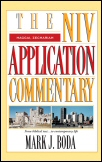
Haggai, Zechariah
- Author: Mark J. Boda
- Publisher: Zondervan
- Publication Date: 2004
- Pages: 576
Mark J. Boda’s commentary on Haggai and Zechariah helps readers learn how the message of these two prophets, who challenged and encouraged the people of God after the return from Babylon, can have the same powerful impact on the community of faith today.
The books of Haggai and Zechariah represent a golden period in Old Testament history, but they are often overlooked. These two minor prophets speak a major message to the church today. It is one that calls us, as a community of faith, to the priority of God’s house, and inspires us with glimpses of its future glory.
Exploring the links between the Bible and our own times, Mark J. Boda shares perspectives on Haggai and Zechariah that reveal their enduring relevance for our twenty-first-century lives.
Mark J. Boda is a professor of Old Testament and Hebrew at McMaster Divinity College in Hamilton, Ontario. An ordained minister, he enjoys regular preaching opportunities across Canada. He is the author of Praying the Tradition and the editor of a collection of scholarly essays on Zechariah 9–14, Bringing Out the Treasure.
Reviews
0 ratings

Charles C.G. Miller
11/9/2020
I am an experienced lay Bible study teacher for adults. I am so tired of working with books with 10 DVD lessons or 10 chapters in a $5 book. I need more meat in my sandwich. The NIVAC is not technical and does not use Greek or Hebrew without explaining what it means. It is not a "Sermon in a box" commentary for pastors. It is a really good explanation of the value of each book and why we should study it..Each NIVAC book divides the Biblical book into practical sections and then 4 subsections for each sections. 1. The NIV text. 2. The "Original Meaning." 3. "Bridging Contexts" to help us understand what is in the section. 4. "Contemporary Significance" to help us understand the message for today. I love the Word Biblical Commentary, or Barclay or Wiersbe; but NIVAC is my go to series whether I am looking for a book for a teacher or a book for the whole class to buy.